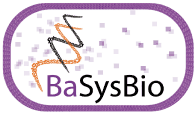
Objective
The overall objective of BaSysBio is to generate quantitative data about the network components at all the levels of the information flow in order to understand at the system’s level the global regulation of gene transcription in bacteria. To achieve this objective, BaSysBio will focus on developing and adapting high-throughput technologies to facilitate quantitative measurements, in conjunction with developing and validating computational systems biology methodologies to enable the quantitative interpretation of the data and unravel the underlying principles of regulatory network interactions. Experimental data will be generated in the highly tractable Gram-positive model bacterium Bacillus subtilis with two specific goals:
- To unravel the global regulatory structure of B. subtilis metabolism to understand how transcriptional regulation is integrated with the other levels of control
- To achieve a quantitative understanding of the cellular transcriptional responses under conditions mimicking pathogenesis and to apply the acquired knowledge and the integrated modelling/experiments strategy developed in the model bacterium to understand the regulatory networks controlling pathogenesis in the closely related disease-causing bacteria Bacillus anthracis and Staphylococcus aureus.
BaSysBio has the ambition to understand the general principles, as well as the mechanistic details of regulatory networks and to drive key discoveries and applications in systems biology. An important element that is critical for the success of BaSysBio is the integration effect generated by concentrating resources in European research. The common development and use of standardised methodologies, procedures and tools will generate a large and unique body of data that will potentially allow a genuinely global understanding of genetic control in bacteria.
The BaSysBio iterative theoretical-experimental strategy which provides quantitative data about the regulatory steps in the information flow from DNA to phenotype will become applicable to multiple cellular processes. This will open the way to the construction of mechanistic models integrating basic regulatory components and their combined interactions at a global scale, potentially leading to in silico models simulating the dynamic behaviour of the whole cell. By elaborating new concepts in computational modelling, BaSysBio will provide new ways to grasp biological complexity and will reveal yet unknown properties of dynamic biological systems. This will open entirely new fields of investigation to experimental biology. Last but not least, the new knowledge and the integrated modelling/experiments strategy developed by BaSysBio will be applicable to other micro-organisms and will promote understanding of the global control of pathogenesis, thus leading to potential new strategies to combat disease-causing bacteria.